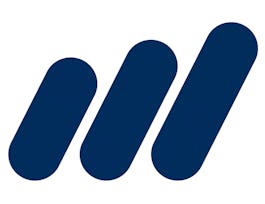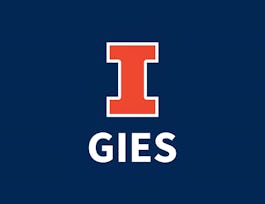The FinTech revolution is rapidly transforming the financial industry. The use of digital technologies is the norm, and together with regulatory and market changes it is creating a revolution. After completion of the module, you'll be able to: describe the changes that influence the financial sector, understand the complexity of the payment infrastructure, identify and explain the key payment instruments and how they function, understand the types of money that exits, and recognize changes in the regulatory frameworks and how they inhibit or promote innovation.



FinTech and the Transformation in Financial Services
This course is part of Digital Transformation in Financial Services Specialization


Instructors: Jonas Hedman
Sponsored by Syrian Youth Assembly
32,737 already enrolled
(1,156 reviews)
Skills you'll gain
Details to know

Add to your LinkedIn profile
23 assignments
See how employees at top companies are mastering in-demand skills

Build your subject-matter expertise
- Learn new concepts from industry experts
- Gain a foundational understanding of a subject or tool
- Develop job-relevant skills with hands-on projects
- Earn a shareable career certificate


Earn a career certificate
Add this credential to your LinkedIn profile, resume, or CV
Share it on social media and in your performance review

There are 5 modules in this course
The FinTech revolution is rapidly transforming the financial industry. The use of digital technologies is the norm, and together with regulatory and market changes it is creating a revolution. To begin, we recommend taking a few minutes to explore the course site. A good place to start is the navigation bar on the left. Click 'Course Content' to see what material we will cover each week, as well preview the assignments you will need to complete. Click 'Discussions' to see forums where you can discuss the course material with fellow students taking the class. Be sure to introduce yourself to everyone in the 'Meet and Greet' forum! This course should take four weeks to complete. You can check out the recommended course schedule below to see a quick overview of the lessons and assignments you will complete each week. After completion of the course, you'll be able to: describe the changes that influence the financial sector, understand the complexity of the payment infrastructure, identify and explain the key payment instruments and how they function, understand the types of money that exits, and recognize changes in the regulatory frameworks and how they inhibit or promote innovation.
What's included
1 video1 reading1 discussion prompt
In this module, we begin exploring FinTech. We start off by get to know Fintech, by looking into six different FinTech domains, followed by FinTech as an area of investments. Then we dig into the technologies of FinTech, before we look at the regulatory changes that transforms the industry. After completion of the module, you will be able to: summarize the domains of FinTech; describe the FinTech market and make arguments for what the sector is emerging; outline the Financial technologies and how the are transforming the market; give examples of how regulations influence the FinTech market
What's included
5 videos13 readings8 assignments1 discussion prompt
At the heart of the Fintech revolution you will find money and payments. It makes the world go around. In this module, we will learn about money and its history, difference between central bank money and bank money, different payment instruments, and finally how payment instruments are used in contemporary payment methods.
What's included
5 videos12 readings5 assignments2 discussion prompts
Money has several roles, including a medium of exchange, i.e. as a payment. In this module, we focus on the complex digital platforms or eco-systems that surrounds payments. We this from four different perspectives or level of analysis, including bank level, national level, and cross border level. However, first we shall look into the payment process.
What's included
5 videos6 readings4 assignments
The digital transformation is radically transforming the financial services as we used to know them and new areas and domains emerge. In this module, we are focusing on three areas. First, we look at P2P lending, then crowdfunding, before we conclude with open banking.
What's included
3 videos8 readings6 assignments1 discussion prompt
Instructors


Offered by
Why people choose Coursera for their career




Learner reviews
1,156 reviews
- 5 stars
54.49%
- 4 stars
27.07%
- 3 stars
10.98%
- 2 stars
4.41%
- 1 star
3.02%
Showing 3 of 1156
Reviewed on Dec 6, 2019
Good lessons and subject matter, but a number of the reading links are broken and some of the quiz questions I could not find the answers to.
Reviewed on May 16, 2018
The course gave a great insight on importance and utility of Technology in Financial Services and how FinTech is the future for all.
Reviewed on Nov 1, 2019
This course is really helpful to have clear idea about the FinTech services and how this is working to promote Cashless Society.
Recommended if you're interested in Business

Corporate Finance Institute

University of Illinois Urbana-Champaign

University of Maryland, College Park

Board Infinity

Open new doors with Coursera Plus
Unlimited access to 10,000+ world-class courses, hands-on projects, and job-ready certificate programs - all included in your subscription
Advance your career with an online degree
Earn a degree from world-class universities - 100% online
Join over 3,400 global companies that choose Coursera for Business
Upskill your employees to excel in the digital economy


